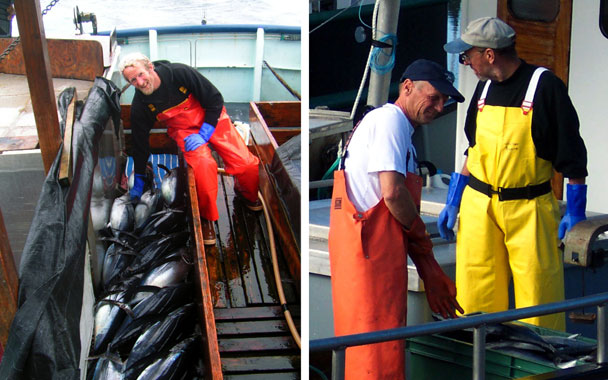Carnivore’s Delight
It’s not often that you’ll find this space singing the praises of vertical integration in agriculture, but I was heartened to read this week that Joel Salatin of Polyface Farm (the subject of a September 2002 profile in Gourmet who became the national face of sustainable food production after being featured in Michael Pollan’s The Omnivore’s Dilemma) had bought the small, 70-year-old slaughterhouse in Virginia that processes his grass-fed cattle.
This is good news because small meatpacking operations in this country have been closing in droves, unable in many cases to comply with stringent USDA regulations designed for the enormous facilities that handle most American meat today. As a result, sustainable livestock farmers have had to truck their animals over great distances, or in some cases cease raising cattle, sheep, and hogs altogether for want of an approved slaughterhouse. T&E Meats, as Salatin’s company is known, will continue processing his animals and also those of nearby small producers.
I’m going to knock on wood, but I dare say Salatin may be part of a trend here. Earlier this spring, two other grass-fed beef producers, White Oak Pastures in Georgia and Paicines Ranch in California, opened their own slaughterhouses.
They obviously see a demand. Owning their own plants is a sure way to guarantee they can meet it.
Tuna Without Guilt
Raw, grilled, canned—I love tuna. But eating it these days is becoming almost impossible to justify on environmental grounds, which is why I was glad to get word this week that the West Coast’s fleet of albacore tuna trollers had set sail and will be returning to port over the next few days with the season’s first catch of just about the only tuna you can eat with a clear ecological conscience. In American waters, albacore are caught singly on a hook and line from small boats and are rated as a “best” choice by Seafood Watch. Most other tuna fall into the “avoid” category.
As an Easterner, I have to voice one serious complaint about the fish: They can be hard to find. What tuna lovers in Washington, Oregon, and California don’t scarf up within a few hours’ drive from the wharves gets exported to Europe and Japan. Fortunately, in May a trade group launched a website listing sources for albacore. With a little help from the Worldwide Web, I hope to score my share this summer.
Actions Speak Louder than Words
That’s what I have to say to the board of directors and shareholders of the grocery giant Kroger. The company—which rakes in $70 billion annually—bombarded the media with press releases this spring trumpeting its commitment to sustainability. But late last month, Kroger shareholders, on the recommendation of the board of directors, resoundingly voted down four proposals to make the firm greener and more humane.
At the annual meeting held in Cincinnati, only 40 percent of those casting ballots agreed that the company should develop a comprehensive policy on climate change. They were similarly negative on the idea that it should report its policies regarding toxic chemicals. Suggestions that Kroger favor poultry suppliers who use humane “controlled atmospheric killing” (gassing) methods and that the store phase out sales of eggs from confined chickens were nixed by fully 95 percent of those voting.
I’ve heard of shareholders’ revolts. Is this a case of revolting shareholders?




 Pinterest
Pinterest


